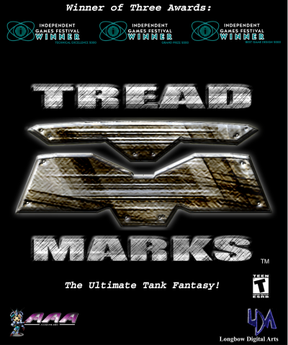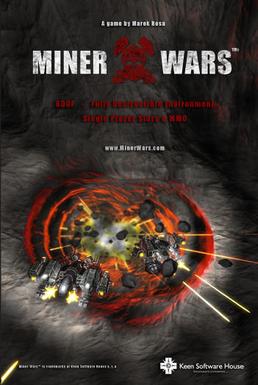
Freeciv is a single- and multiplayer turn-based strategy game for workstations and personal computers inspired by the proprietary Sid Meier's Civilization series. It is available for most desktop computer operating systems and available in an online browser version. Released under the GNU GPL-2.0-or-later, Freeciv is free and open-source software. The game's default settings are closest to Civilization II, in both gameplay and graphics, including the units and the isometric grid. However, with a lot of multiplayer games being played in longturn communities, rulesets and additional variants have evolved away from the original ruleset. Freeciv is playable online at Longturn.net, Freecivx.net, freecivweb.org and some temporary private servers.

Quake II is a 1997 first-person shooter video game developed by id Software and published by Activision. It is the second installment of the Quake series, following Quake.

Rise of the Triad: Dark War is a first-person shooter video game, developed and published by Apogee Software in 1995. The player can choose to play as one of five different characters, each bearing unique attributes such as speed and endurance. The game's story follows these five characters who have been sent to investigate a deadly cult, and soon become aware of a deadly plot to destroy a nearby city. A remake was designed by Interceptor Entertainment and released by Apogee Games in 2013. The shareware version of the game is titled Rise of the Triad: The HUNT Begins.

Return to Castle Wolfenstein is a first-person shooter video game developed by Gray Matter Studios and published by Activision. It was released on November 20, 2001 for Microsoft Windows and subsequently for PlayStation 2, Xbox, Linux, and Macintosh. The game serves as a reboot of the Wolfenstein series. id Software, the developers of Wolfenstein 3D, oversaw the development and were credited as executive producers. The multiplayer side eventually became the most popular part of the game, and was influential in the genre. Splash Damage created some of the maps for the Game of the Year edition. A sequel, titled Wolfenstein, was released in 2009.

Simple DirectMedia Layer (SDL) is a cross-platform software development library designed to provide a hardware abstraction layer for computer multimedia hardware components. Software developers can use it to write high-performance computer games and other multimedia applications that can run on many operating systems such as Android, iOS, Linux, macOS, and Windows.

Wolfenstein: Enemy Territory is a free and open-source multiplayer first-person shooter video game within the Wolfenstein series. It was originally planned to be released as a commercial expansion pack to Return to Castle Wolfenstein and later as a standalone game. However, due to problems with the single-player aspect, the multiplayer portion was released on 29 May 2003 as a freeware standalone game. In January 2004, the source code for the game logic was released to the benefit of its modding community.
VisualBoyAdvance is a free emulator of the Game Boy, Game Boy Color, and Game Boy Advance handheld game consoles as well as of Super Game Boy and Super Game Boy 2. It is still downloadable to this day.

Tread Marks is a 3D, third-person perspective, multiplayer-focused tank combat and racing computer game developed by Independent video game developer Longbow Digital Arts. The game won the 2000 Independent Games Festival grand prize, later renamed to the Seumas McNally Grand Prize in honor of the game's lead programmer Seumas McNally who died on 21 March 2000, after receiving the award. A notable feature of the game is fully deformable terrain.

Abuse is a run and gun video game developed by Crack dot Com and published by Electronic Arts in North America and Origin Systems in Europe. It was released on February 29, 1996 for MS-DOS. A Mac OS port of the game was published by Bungie and released on March 5, 1997. The game's source code, along with some of the shareware content, has been in the public domain since the late 1990s and has been ported to Linux and many other platforms.
Pygame is a cross-platform set of Python modules designed for writing video games. It includes computer graphics and sound libraries designed to be used with the Python programming language.

Jump 'n Bump is a 1998 freeware and open-source MS-DOS platform multiplayer video game by Brainchild Design.

FCEUX is an open-source Nintendo Entertainment System and Family Computer Disk System emulator. It is a merger of various forks of FCE Ultra.

Triplane Turmoil is a sidescrolling dogfighting flying game for MS-DOS by Finnish developer Dodekaedron Software. The game is based on the 1984 MS-DOS game by David Clark, Sopwith. Originally released as shareware, in 2009 Dodekaedron placed the source code, documentation, images and sounds under the GPLv3 on SourceForge, hosted later on github.com. The community continued the support and ported the game via SDL to other platforms including Linux and Windows.

SuperTuxKart (STK) is a free and open-source kart racing game, distributed under the terms of the GNU General Public License, version 3. It features mascots of various open-source projects. SuperTuxKart is cross-platform, running on Linux, macOS, Windows, iOS (beta), Android systems and Nintendo Switch (homebrew).

Tux, of Math Command is an open source arcade-style video game for learning arithmetic, initially created for Linux.

Box2D is a free open source 2-dimensional physics simulator engine written in C by Erin Catto and published under the MIT license. It has been used in Crayon Physics Deluxe, Limbo, Rolando, Incredibots, Angry Birds, Tiny Wings, Shovel Knight, Transformice, Happy Wheels, and many online Flash games, as well as iPhone, iPad and Android games using the Cocos2d or Moscrif game engine and Corona framework. It has also been used in the Unity.

Xonotic is a free and open-source first-person shooter video game. It was developed as a fork of Nexuiz, following controversy surrounding the game's development. The game runs on a heavily modified version of the Quake engine known as the DarkPlaces engine. Its gameplay is similar to Quake Arena series games, but with various unique elements.

Miner Wars 2081 is a six degrees of freedom action-survival space-shooter simulation game produced by Keen Software House. The gameplay offers a choice of single player, co-op, and deathmatch multi-player. The game is set in the year 2081, 11 years after the destruction of all planetary objects in the Solar System. The story introduces the player to many types of missions: rescue, exploration, revenge, base defense, theft, transportation, stealth, search and destroy, pure harvesting or racing. A multiplayer spin-off game, Miner Wars Arena, was also released in 2012.

Gun Buster, also known as Gunbuster (ガンバスター) and released in North America as Operation Gunbuster, is a first-person shooter video game developed by Taito and released for arcades in 1992. In contrast to on-rail light gun shooters at the time, this was one of the first arcade games to feature free-roaming FPS gameplay, the same year Wolfenstein 3D was released on personal computers.

PPSSPP is a free and open-source PSP emulator for Windows, macOS, Linux, iOS, Android, Nintendo Wii U, Nintendo Switch, BlackBerry 10, MeeGo, Pandora, Xbox Series X/S and Symbian with a focus on speed and portability. It was released to the public on November 1, 2012, licensed under the GNU GPLv2 or later. The PPSSPP project was created by Henrik Rydgård, one of the co-founders of the Dolphin emulator.

















